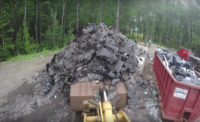Growing homeowner interest in sustainable building solutions — including products and their afterlife — presents a number of business opportunities for contractors. Sure, there is more to keep up with in terms of product offerings and services, but the benefits may mean more profitable and rewarding relationships between contractors and customers.
Asphalt shingle recycling is an example of a sustainable building solution that has continued to gain traction and deliver measurable results for contractors. With shingle recycling programs now active in 65 major markets across the United States, participating contractors have found offering this recycling capability can directly influence contractor selection, and ultimately, translate into more jobs.1 Roof recycling also costs at least 20 percent less than landfill costs in most markets, making it a smart savings opportunity.2
In fact, a consumer study conducted by Owens Corning Roofing and Asphalt found homeowners want to work with contractors who offer to recycle used shingles. Of course, there is also an environmental benefit. Recycling the shingles from one roof is comparable to what one household produces in waste in a year.
Making ‘Cents’ and Building Community
Cincinnati roofer Nick Sabino has experienced firsthand the benefits of tapping into a recycling program. Implementing a recycling program for his business, Deer Park Roofing Inc. in 2010, has helped establish his company as a trusted roofing advisor and provided Sabino with the initiative to add insulation and energy efficiency solutions for customers. Deer Park Roofing has grown to be one of the area’s top-performing roofing companies.
Sabino’s participation in the local shingle recycling program also benefits the community. To date, more than 500 tons of shingles from Deer Park Roofing have been recycled for use in paving and repairing local roads — equivalent to 500 barrels of oil, or enough fuel to run an average car for more than 460,000 miles.3
For Rodney Standifer of ABC Roofing Co., Inc., in Indianapolis, participating in a recycling program proved to be a point of differentiation that set his business apart from the competition. Appealing to customers who actively recycle, Standifer said his business also attracts new customers who are intrigued by a sustainable solution for their old roof. Moreover, customer support from the recycling program has generated referrals in neighboring communities.
“Offering a shingle recycling program to the community is a win-win situation. Homeowners appreciate knowing the old roof gets a second life,” said Standifer. “It also gives us a competitive edge.”
National Programs Offer Support to Contractors
Offering shingle recycling does not add complex layers to a contractor’s business. There are multiple resources available that offer information and resources to help make the transition a smooth one. Following are a few tips to get started:
• Earth911.com and 1-800-CLEANUP offer a database of shingle recycling facilities.
• For the tech-savvy contractor, there is a free iRecycle app for Android and iOS mobile devices.
• Contractors should call the recycling facility and ask about any restricted materials, hours of operations and associated costs. Some facilities may also offer tips for sorting and delivering materials.
As part of its Preferred Contractor program, Owens Corning Roofing and Asphalt offers incentives to recycle as part of the Owens Corning™ Shingle Recycling Program. The program launched three years ago in partnership with Heritage Environmental Services. In addition to offering a five to 10 percent discount on the recycling fee at participating locations, preferred contractors who take the shingle recycling pledge receive leads from interested homeowners, marketing materials and a “Preferred Shingle Recycler” status on www.owenscorning.com, further increasing their visibility among homeowners.
Owens Corning Roofing and Asphalt launched a homeowner pledge available at www.roofing.owenscorning.com. The site encourages homeowners to “pledge” to use a contractor who will recycle their old shingles when the time is right to replace their roof. This online tool also gives them the opportunity to connect with a participating local contractor. Additionally, as homeowners take the pledge, contractors receive notifications about potential leads in their area.
“Convenience and cost-savings are evident, but shingle recycling also helps roofing contractors differentiate their company and, in turn, increase appeal to customers,” said Barry Hornbacher, Owens Corning Roofing and Asphalt shingle recycling business leader. “In addition to providing sustainable products, we aim to provide solutions that benefit contractors through the full life cycle of the product.”
The Future of Roof Recycling
While shingle recycling has come a long way in a short amount of time, there is still a lot of work ahead. In addition to the need for more recycling facilities available nationwide, there is an opportunity for paving producers to understand the benefits of incorporating shingles for cost-savings and beyond. Currently, many areas do not accept recycled asphalt shingles to use in paving state funded roads.
However, the Asphalt Roofing Manufacturers Association (ARMA) established a task force to build awareness for shingle recycling efforts and solutions. Additionally, ARMA’s annual Shingle Recycling Forum, the largest conference for shingle recycling, focuses on exchanging ideas and information between manufacturers and businesses.
As recycling continues to gain support across the industry, more roofing contractors will reap the business benefits, and so will their local communities.
To learn more about the benefits of shingle recycling or for tips to help get started, visit www.roofing.owenscorning.com.
Notes:
1. Owens Corning Roofing and Asphalt, LLC Brand Recognition Survey utilizing ZoomPanel, August 2011.
2. Based on a survey of eight markets in the U.S. for recycling costs versus landfill costs by Owens Corning Roofing and Asphalt, LLC, July 2012.
3. Actual results as reported by Heritage Environmental Services, July 2012; calculated amounts for barrels of oil and miles traveled.



Report Abusive Comment